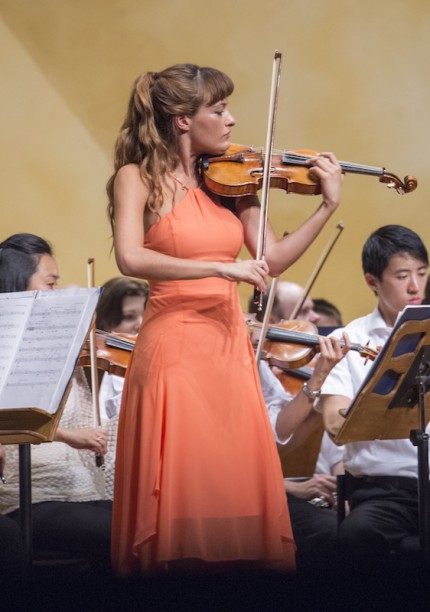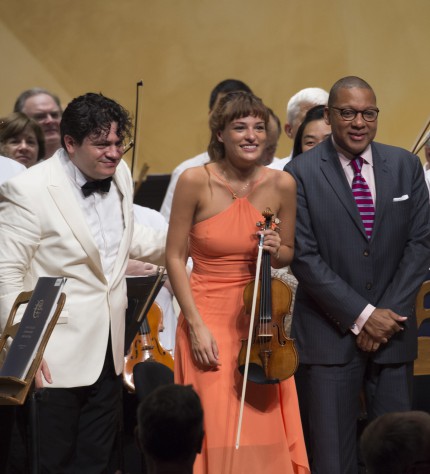Benedetti, CSO give Marsalis premiere impassioned advocacy at Ravinia

It’s a sign of the times that even at a summer escape destination like the Ravinia Festival audience members now get wanded by security as they enter the park.
Musical safety has been the watchword as well in recent seasons at the bucolic Highland Park venue, as crossover, film scores and the most familiar cornerstones continue to make up most of the orchestral bill of fare.
But give credit where credit is due. Ravinia opened the Chicago Symphony Orchestra’s summer season Tuesday night with the U.S. premiere of Wynton Marsalis’s Concerto in D, performed by violinist Nicola Benedetti with Cristian Măcelaru conducting.
In an era of conservative repertoire dominating the CSO’s downtown programs, Ravinia deserves kudos for leading off the CSO’s summer series with a co-commissioned premiere by a leading American voice.
Best known as a celebrated jazz trumpet player, Marsalis has also composed several scores for classical forces. These include his Swing Symphony and two large-scale oratorios, All Rise and Blood on the Fields, the latter winning the Pulitzer Prize for music in 1997.
Marsalis’s Concerto in D–co-commissioned by six organizations, including Ravinia–was premiered by Benedetti with the London Symphony Orchestra led by James Gaffigan last November.
The concerto is cast on a large scale, spanning four movements and 40 minutes. The title inevitably, recalls Gershwin’s Concerto in F for piano and Stravinsky’s Concerto in D for string ensemble as well as his Violin Concerto in the same key.
Clearly this is an American concerto by an American composer that wears its musical national colors proudly.
The first movement (“Rhapsody”) opens with a lullaby. Benedetti’s serene yet angular violin theme is in the sweet-sad strain that seems an inevitable part of the national musical fabric. The tempo accelerates into a loping, sidewinding theme punctuated by some brassy big-band tuttis. A nightmarish section is characterized by violent orchestral outbursts and lion-like brass snarls. A cadenza for the soloist leads into a stride section with the orchestra basses thumping the backs of their instruments.
“Rondo burlesque” is fast and frenetic with bluesy slides for the solo violin. The expression is hard-edged and satiric with a parodistic “circus” atmosphere with whooping brass. An extended violin cadenza leads off with pizzicato jazz accents, segueing into the “Blues” section. A theme in the winds leads to the violinist’s note-bending melody, with some lovely soft playing by Benedetti at the coda.
The concluding “Hootenanny” returns to the sardonic style, with the souped-up music akin to Copland on hard cider. There is foot-stomping by the orchestra musicians, gospel cries, and explosive statements by the orchestra, which occasionally buried the solo violin line. The concerto concludes, surprisingly, on a mellow, almost throwaway gentle coda.

As the movement titles suggests Marsalis freely mines such wide-ranging styles as country fiddling, blues, gospel and, of course, jazz. Where such music can sound like pastiche in lesser hands, Marsalis blends the classical form and populist elements with much greater fluency and confidence than most, befitting his stature as one of the leading jazz musicians of our day. There are also plenty of show-offy bravura solo opportunities for the soloist.
Marsalis revised his concerto before the London premiere and again, substantially, afterward. Yet over the course of this 40-minute work, the Concerto in D still feels overlong and unfocused. There is a prevailing lightness of being here and the invention and musical development are often decidedly thin. Amid the whooping comical brass, foot stomping and musicians shouting gospel calls (not a high point), one waits in vain for moments of deeper emotion or greater expressive depth. Ultimately one never gets the sense that the concerto has anything significant to say beyond its gaudy populist trimmings.
Still, Marsalis’s Concerto in D is an undeniably engaging and enjoyable work, and this U.S. premiere received impassioned, fully committed advocacy from Nicola Benedetti, for whom it was written. The Scottish violinist brought out the moments of lyrical poetry with a touching sense of delicate fantasy and blazed through the virtuosic demands with total command and assurance.
Macelaru’s conducting of the orchestra often hewed to the near side of loud, but he also balanced the sometimes garrulous scoring well and kept Marsalis’s score moving forward. The composer received a thunderous ovation from the audience Tuesday night.
Two of Ottorino Respighi’s Mediterranean aural postcards completed the program, slight but suitable music for an al fresco evening.
The Fountains of Rome is the most restrained of Respighi’s Roman triptych. Măcelaru led the orchestra in an alert, attentive rendering though one with a straitened dynamic range that would have benefited from greater dynamic nuance and subtlety at the low end.
The Pines of Rome proved much more effective and better balanced overall. The moody “Catacombs” section was especially lovely, with an evocative trumpet solo by the unfortunately soon-to-depart principal Christopher Martin. With extra brass forces stationed at either side of the pavilion, the evening closed with a suitably grandiose and rousing sonic blast of the approaching Roman legions.
Cristian Măcelaru leads the Chicago Symphony Orchestra in John Adams’ Short Ride in a Fast Machine, Strauss’s Also sprach Zarathustra, and Holst’s The Planets (with HD film) 8 p.m. Wednesday at Ravinia. ravinia.org.
Posted in Performances